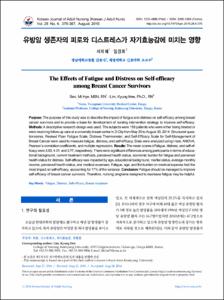The effects of fatigue and distress on self-efficacy among breast cancer survivors
- Keimyung Author(s)
- Lim, Kyung Hee
- Department
- Dept. of Nursing (간호학)
- Journal Title
- korean Journal of Adult Nursing
- Issued Date
- 2016
- Volume
- 28
- Issue
- 4
- Keyword
- Fatigue; Distress; Self-efficacy; Breast neoplasm
- Abstract
- PURPOSE: The purpose of this study was to describe the impact of fatigue and distress on self-efficacy among breast cancer survivors and to provide a base for development of nursing intervention strategy to improve self-efficacy. METHODS: A descriptive research design was used. The subjects were 158 patients who were either being treated or were receiving follow-up care at a university breast center in D City from May 30 to August 30, 2014. Structured questionnaires, Revised Piper Fatigue Scale, Distress Thermometer, and Self-Efficacy Scale for Self-Management of Breast Cancer were used to measure fatigue, distress, and self-efficacy. Data were analyzed using t-test, ANOVA, Pearson's correlation coefficients, and multiple regressions. RESULTS: The mean scores of fatigue, distress, and self-efficacy were 3.83, 4.31, and 3.77, respectively. There were significant differences among participants in terms of educational background, current treatment methods, perceived health status, economic burden for fatigue and perceived health status for distress. Self-efficacy was impacted by age, educational background, marital status, average monthly income, perceived health status, and medical expenses. Fatigue, age, and the burden on medical expense had the most impact on self-efficacy, accounting for 17% of the variance. CONCLUSION: Fatigue should be managed to improve self-efficacy of breast cancer survivors. Therefore, nursing programs designed to decrease fatigue may be helpful.
- Keimyung Author(s)(Kor)
- 임경희
- Publisher
- College of Nursing
- Citation
- Seo, Mi Hye and Lim, Kyung Hee. (2016). The effects of fatigue and distress on self-efficacy among breast cancer survivors. korean Journal of Adult Nursing, 28(4), 378–387. doi: 10.7475/kjan.2016.28.4.378
- Type
- Article
- ISSN
- 1225-4886
- Appears in Collections:
- 2. College of Nursing (간호대학) > Dept. of Nursing (간호학)
- 파일 목록
-
-
Download
 oak-2017-0279.pdf
기타 데이터 / 654.38 kB / Adobe PDF
oak-2017-0279.pdf
기타 데이터 / 654.38 kB / Adobe PDF
-
Items in Repository are protected by copyright, with all rights reserved, unless otherwise indicated.